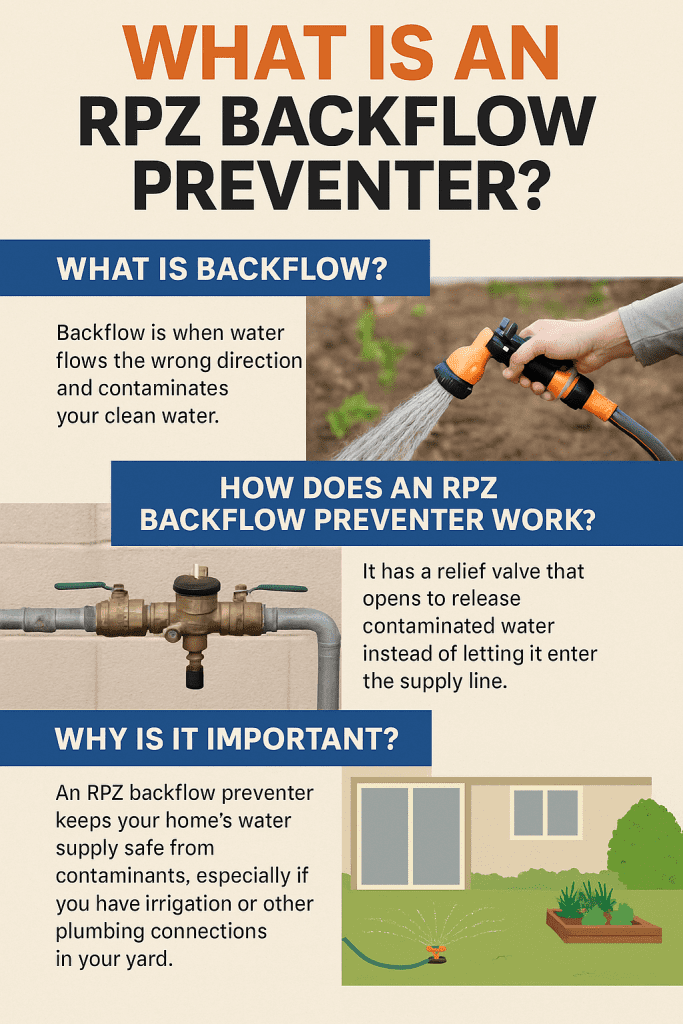
Let’s be honest. When someone first mentioned an RPZ backflow preventer to me, I nodded like I knew what they were talking about… but I didn’t. And if you’re in the same boat right now, you’re not alone.
It sounds technical—and yeah, it kind of is—but once you understand what it does, it actually makes a lot of sense. Especially if you’ve got sprinklers, a commercial space, or any sort of water system that connects outside.
This little device might be one of the most important things you never think about.
What Is an RPZ Backflow Preventer?
RPZ stands for Reduced Pressure Zone. That’s a fancy name for a valve that’s designed to stop dirty water from flowing back into your clean water supply.
Picture this: You’re running your sprinklers, and some fertilizer gets picked up by the spray. Then, the water pressure in your home suddenly drops—maybe the city’s working on a line, or a hydrant’s been opened nearby.
Without a backflow preventer in place, the water that’s already in your pipes can reverse direction. It pulls that fertilizer, dirt, or whatever else is hanging out in your system, straight back into your clean drinking water.
Now imagine that same water coming out of your kitchen tap. That’s exactly what an RPZ device is there to prevent.
Why Does This Matter to You?
If you’re a homeowner with a sprinkler system, a business owner running a car wash, or even just someone who has a hose attachment that mixes chemicals (like fertilizer or soap)—you could be at risk of backflow.
And here’s the thing most people don’t realize: In a lot of places, backflow preventers aren’t optional. They’re required by code. Even if they weren’t? I’d still want one.
It’s a quiet layer of protection you’ll forget about—until the moment you’re glad it’s there.
A Real-Life Moment
We installed an irrigation system in our backyard last summer—one of those automatic setups with timers and fertilizer attachments. Looked great. Worked great.
Then during a routine plumbing check, our guy asked if we had an RPZ backflow preventer in place.
We didn’t.
And suddenly all the work we’d done felt… risky. If that pressure ever flipped, we could’ve been pulling garden chemicals back into our main line. Not just into our kitchen sink—but possibly into the neighborhood supply. That was enough to make me pick up the phone and get one installed the same week.
Why Regular Testing Is a Big Deal
Here’s the part folks forget: even the best backflow preventer devices don’t last forever. Seals wear out. Valves corrode. And if something fails, you might not know until the damage is done.
That’s why regular backflow testing matters—especially for businesses. It usually takes less than an hour, and it gives you peace of mind. Some cities even send reminders because it’s required yearly.
People Also Ask:
Q: Is this just for big commercial buildings?
Nope. Plenty of homes need them too. If you’ve got irrigation or outdoor plumbing, you’re probably on that list.
Q: How often does it need to be tested?
Usually once a year. Even if your water seems fine, it’s worth doing. Quiet failures are a thing.
Q: Can I install it myself?
In most places? No. A licensed plumber needs to install and test it. It’s not just for safety—it’s a legal thing.
Q: What if I don’t have one?
You might be okay—for now. But one pressure drop or plumbing issue, and the whole system could be contaminated. It’s not worth the gamble.
Final Thought
What is an RPZ backflow preventer?
It’s a valve that sits between your clean water and everything else. It doesn’t ask for attention. It doesn’t beep or flash. But when pressure shifts or something goes sideways, it’s the first line of defense between you and contaminated water.
It’s one of those small, quiet upgrades that protects everything else—your family, your plumbing, your peace of mind.
So if you’re working on your yard, renovating your business, or even just planning ahead… ask about it. Talk to your plumber. It’s a simple question that could save you from a huge headache later.
Author
-

James is a certified backflow specialist with over 20 years of hands-on experience in plumbing safety.
He’s passionate about educating homeowners and businesses on the importance of clean water systems.
James simplifies complex maintenance tips through clear, practical advice.
When he's not writing, you'll find him inspecting valves or training the next generation of backflow testers.

